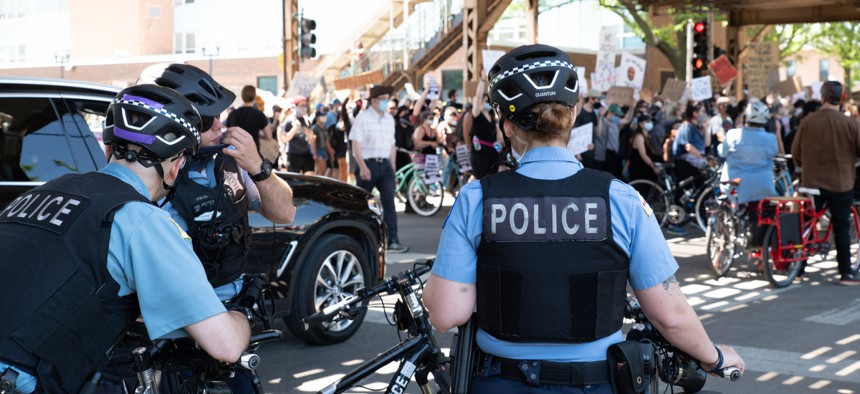To More Easily Ban Problem Police Officers, Some States Focus on Licensing

Chicago police at a recent protest. The Illinois Attorney General has called for a state licensing system that would make it easier to decertify police who engage in misconduct. Shutterstock
Proponents of professional licensing for police say that such a system would make it easier to fire an officer for misconduct.
As state and local leaders consider ways to weed out bad cops, one idea that’s gained currency in a few states is requiring police officers to get licenses or strengthening certifications that already exist.
Like doctors, lawyers, electricians, teachers, pharmacists, cosmetologists, and other occupations that require different levels of training, police officers in most states are required to hold a license or other certification. State licensing systems for police typically create minimum training standards for the profession, as well as definitions for misconduct that can cause someone to lose that license. (Most professions are licensed at the state level, but other professions, like truck drivers, have standards set by the federal government.)
Over 40 states already have police certification or licensing systems and some version of a Peace Officer Standards and Training Commission that has the power to decertify police in cases of wrongdoing. In states that lack these systems, or where officials believe they aren’t strong enough, the issue has become a hot topic for reformers in recent months.
In Illinois, for example, police officers are certified, but they can only lose that certification if they are convicted of serious crimes like sexual abuse. Officers are unlikely to face lasting consequences for misconduct that doesn’t lead to a criminal conviction. In a recent interview with local NPR associate WBEZ, Illinois Attorney General Kwame Raoul said that needs to change, saying the way to do this is creating a new state licensing system for law enforcement.
“I think it’s the responsibility of the legislature to do what they’ve done for many other professions: to have consequence for repeated misconduct or single acts of egregious misconduct,” Raoul said. “If they have an egregious act of official misconduct or a pattern of such, they can have their license taken away such that they cannot participate in that profession anymore and that should be the same thing for a law enforcement officer who is capable of using deadly force in carrying out his or her duties.”
The call for a licensing system, which theoretically could allow an officer to lose a license if administratively found to have done something wrong on the job, recently received support from two key state officials—Chicago Mayor Lori Lightfoot and Illinois Gov. J.B. Pritzker. The Illinois Association of Chiefs of Police has also expressed support for the idea, although one official noted the state might consider beefing up its existing certification system.
In New Jersey, one of the few states with no certification or licensing system in place, state Attorney General Gurbir Grewal has been pushing to license police since December 2019, when he asked the state Police Training Commission to consider the idea (advocacy groups have been pushing for the measure since at least the early 2000s). The PTC is meeting on June 24, at which point they will vote on whether to adopt a licensing system. According to Leland Moore, a spokesperson for the attorney general’s office, “the specific details of the system need to be worked out in the months ahead … but the bottom line is that the system will be designed to ensure that officers who fail to meet defined standards of professionalism not only will lose their job, but will lose their license and ability to work as a police officer in New Jersey.”
“There is a growing consensus among members of the law enforcement community as well as outside stakeholders that New Jersey should have such a licensing system,” Moore said. “It will ensure that officers who engage in misconduct are not able to terminate employment at one agency and resurface at another New Jersey law enforcement agency.”
A movement growing in tandem with calls for police licensing systems is one pushing for a national registry of police misconduct—something advocates say would prevent decertified police officers from gaining a license or employment in a police department in a different state. The idea has gained support from advocacy organizations like the NAACP, as well as many current and former members of law enforcement who say that hidden histories of misconduct make hiring more challenging.
Critics of existing police licensing systems say they are ineffective at decertifying bad cops. One expert noted in 2017 that just three states accounted for half of the 30,000 decertifications of officers across the country. Critics have also pointed out that other professions that don’t require advanced college degrees, like cosmetologists, can still require many more hours of training than law enforcement.
Other frequent critics of police licensing include police unions—though that tide may be shifting following weeks of protest. In California, one of only a handful of states that does not have a process for permanently revoking officers’ badges, the police unions in San Jose, San Francisco, and Los Angeles this week called for the creation of a process that would allow them to root out officers with misconduct records.
In Massachusetts, where the state will soon consider creating a licensing system, 84% of local police chiefs said they supported the idea. “If you have to have a license to cut hair, why shouldn’t you have to have a license to be a police officer?” Jeff Farnsworth, president of the Massachusetts Chiefs of Police Association, told Boston 25 News. “It makes sense. We support it.”
Emma Coleman is the assistant editor for Route Fifty.
NEXT STORY: Supreme Court Declines to Take Up Limits of Legal Immunity for Police






